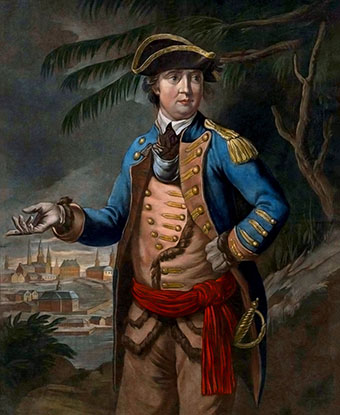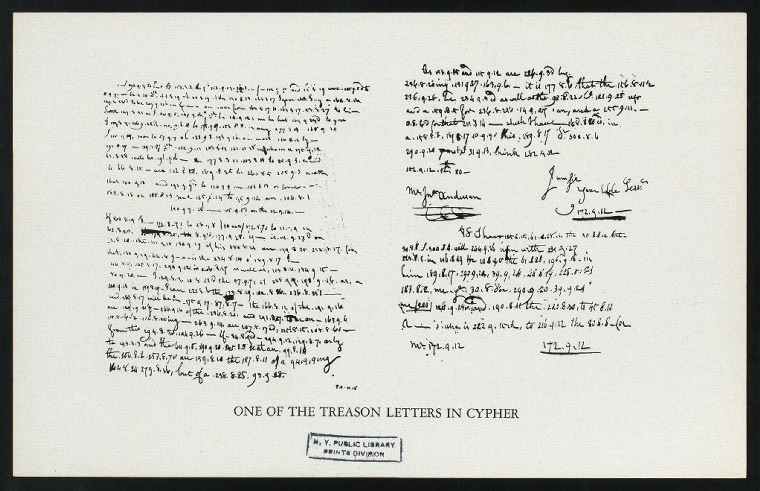Last updated: January 29, 2025
Person
Benedict Arnold

Portrait by Thomas Hart, 1776
Benedict Arnold was born in Norwich, CT in 1741. He was the great-grandson of the Rhode Island governor of the same name. As a young man during the French and Indian War, he enlisted in the New York Militia twice, and twice deserted; each time under pressure from his family to complete an apprenticeship as an apothecary under his uncles at home.
Arnold's parents died when he was 21 and he moved himself and his sister to Hew Haven, CT, where he opened a small store. He became one of the most successful merchants of the coast, owning ships that sailed from the Caribbean to Canada. In 1767 he married Margaret Mansfield, who bore him three sons.
In 1775, Arnold rode as captain of his Connecticut Militia Company to Cambridge, MA to address what had just happened at Lexington. While there he proposed to officials a return attack on the British. In 1775, he was granted permission to lead a force to British Fort Ticonderoga in New York, and capture it. Along the way he encountered Ethan Allen, and the Green Mountain Boys of Vermont, on the same quest. After much argument the two decided to share command; on May 3 they were able to capture the fort with little alarm, as the commander had few guards patrolling the grounds that night. Arnold's party then proceeded from Fort Ti to Crown Point and captured it much the same. If that wasn't enough, the men then captured Fort George (also in the Champlain Valley) all by the end of June 1775. Arnold's wife died that same month.
Although this success was considered a great one, Arnold was, in his opinion, forced from command of these new American posts. This did not hinder his ambition. In September 1775 Arnold participated in the American invasion of Canada, per orders of Gen. Washington. Though the attempt at adding a "Fourteenth Colony" failed with a desperate attack on Quebec, Arnold was considered by most to have served valiantly as a brilliant tactician and hero after being wounded in the leg during battle. For this he was promoted to brigadier general. In the summer of 1776 Arnold's skills as a strategist were once again called upon as he was placed in charge of a new American Naval Fleet in Lake Champlain. His orders from Gen. Horatio Gates were to defend the area and attack only if attacked. Upon learning of a British naval force under Guy Carleton settling in the northern end of the lake, Arnold took his fleet and stationed it towards Valcour Island in October. Several days of battle ensued. Arnold was not able to do much damage to the veteran British fleet. He only saved many of his men after grounding and burning their ships. Yet, in Gates' eyes, he had disobeyed orders by conducting an offensive maneuver.
Now at odds with not only his superiors, but with Congress over promotions he did not receive, 1777 became Arnold's year to prove himself. The first chance came in August, when Gen. Philip Schuyler ordered him to march west from Albany to prevent a force under British commander Barry St. Leger from over-whelming the beleaguered troops at Fort Schuyler. Arnold was able to turn St. Leger's superior force against him by blackmailing a loyalist man into spreading rumors amongst the Indians about his coming. St. Leger's allies retreated leaving him with no support; he ordered the retreat of his Regular force before Arnold ever arrived on August 21.
As Arnold returned to Albany the Northern Army, now under command of Gates, was bearing down for a defensive against John Burgoyne to the north near Stillwater, NY. After the battle at Freeman's Farm and an argument with Gates about whether or not to attack the shaken British force, Arnold was relieved of command. On Oct. 7, Burgoyne struck again closer to the American lines. Seeing the enemy entrenched, Arnold rode to the field of battle to lead an American attack that captured an enemy stronghold all against Gates' orders. This minor victory however, led the Americans to gain the position they needed on the field to force a British surrender. Arnold was wounded in the same leg that suffered injury in Canada. Scorned by Gates, but officially thanked by Washington and Congress, he was promoted to Major General and sent to Philadelphia to recover, as he could not command the field.
Below: Peggy Shippen (wife of Benedict Arnold) with one of her children, possibly her daughter Sophia (1785–1828). Painting by by Daniel Gardner.
While there he married Peggy Shippen, a girl with loyalist sentiments who bore him four sons. She is most famous though, for putting him in contact with the British commanders he would later side with. As allegations of his loyalties and conduct surfaced he requested a change of command that would put him back in New York in command of West Point, a well fortified American stronghold along the Hudson River, which he would later try to deliver into the hands of the British. Its capture would have been a great blow to the Americans. Although, he was unable to deliver this prize, Arnold was rewarded by them with a commission as a brigadier general in the British Army, a pension, funds for lost property, and command of deserters and Tories. The reasons for his change of sides have been, and will be, the subject matter of much speculation, conversation, and endless books.
It has been said that had Benedict Arnold died at the Battles of Saratoga, he would have been considered as one of America's greatest heroes. Instead, he died in England in June of 1801 as Gen. Washington's most brilliant tactician and America's worst betrayer.
Below: This is a copy of one of Benedict Arnold's coded communications with the British while he was negotiating what eventually became a failed attempt to surrender the fort at West Point in 1780. Lines of text written by his wife, Peggy Shippen Arnold, are interspersed with coded text (originally written in invisible ink) written by Arnold. Public domain image courtesy of the New York Public Library.
